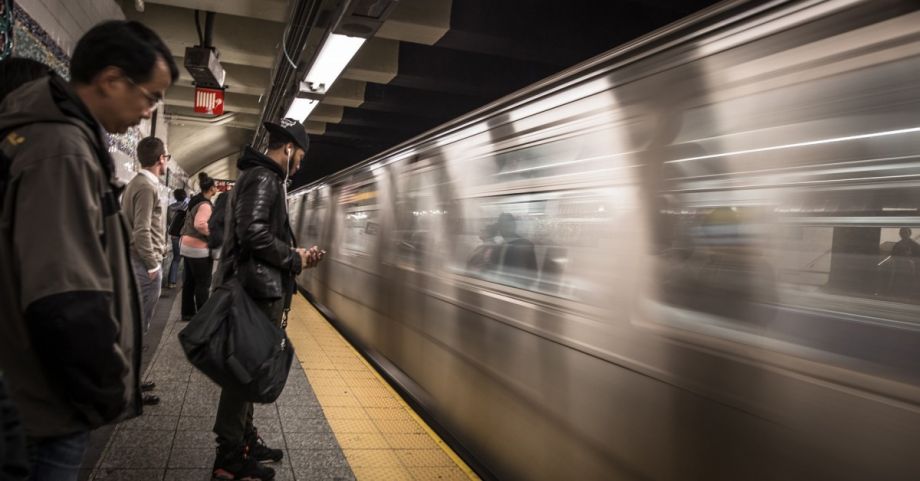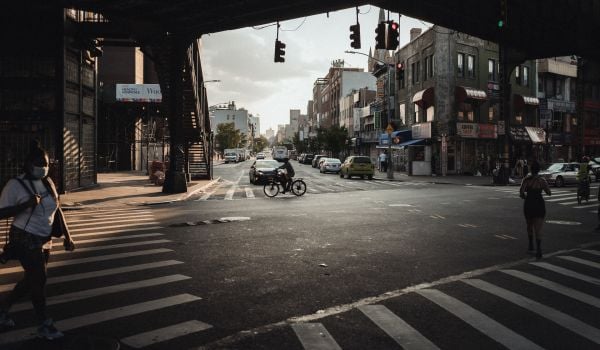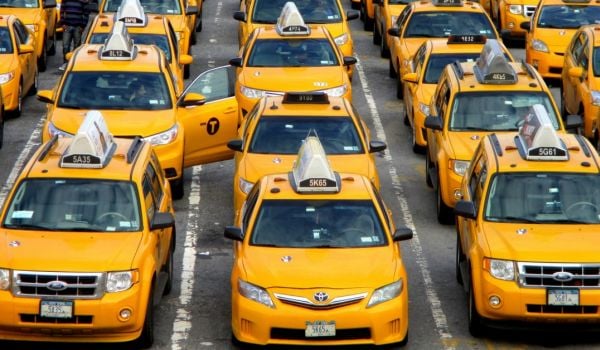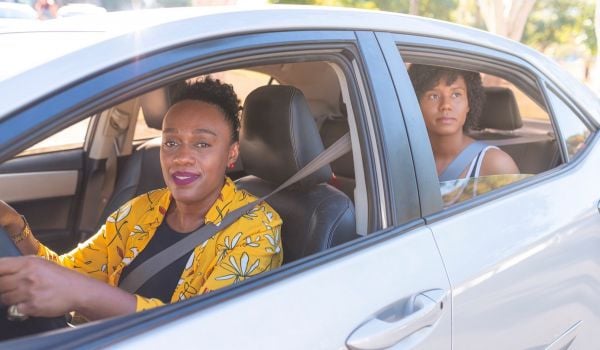Welcome to “The Mobile City,” our weekly roundup of new and newsworthy transportation developments.
The COVID-19 lockdowns of last spring put a number of “cities that never sleep” to sleep overnight. On the transportation front, the ultimate symbol of this was the decision to end overnight subway service in New York for the first time since the subway opened in 1904 (“The Mobile City,” May 6, 2020). But now that the country is getting vaccinated at a rapid clip, many states and cities are moving just as quickly to lift all the restrictions imposed over a year ago. Among them: New York City, which will see 24-hour subway service return on May 19 as part of a coordinated three-state effort to resume business as usual, more or less, in the Big Apple.
But the lifting of the COVID restrictions also threatens to bring an end to some very popular alterations to city streets made in the wake of the sharp falloff in car traffic. The changes are called “complete streets,” “slow streets” or “open streets,” but they all seek to make city streets places to serve people over cars. Constituencies in favor of keeping those changes in place have arisen across the country, but so has pushback against them.
Meanwhile, a New York provider of shared e-mopeds is attempting to create a fleet of electric ride-hailing vehicles through a loophole in that city’s cap on ride-hailing vehicles. Now that it’s ready to roll out the fleet, though, the city has closed that loophole around the company.
Round-the-Clock Subway Service to Resume in New York City May 17
In what appears to be a coordinated effort, the states of New York, New Jersey and Connecticut are all moving to lift almost all restrictions on businesses on May 19, the New York Times reports.
The aim of the reopening, of course, is to get the nation’s largest city, New York, back on its feet after an extremely challenging year. And one of the moves being made to get it back on its feet is resuming all-night subway service.
The Times also reports that New York Gov. Andrew Cuomo announced that 24-hour service on MTA New York City Transit’s subway network would resume May 17 at a news conference in Albany this past Monday (May 3).
The MTA, which Cuomo had ordered to begin the four-hour overnight closures on May 6 of last year in order to deep-clean stations and trains, was already heading in the direction of resuming all-night service: in February, it had shortened the no-service period to two hours, from 2 to 4 a.m. The Times article notes that the Centers for Disease Control and Prevention has recently acknowledged something scientists have been saying for months: The risk of catching the coronavirus from surface contact is very low.
Fortune’s report on the reopening notes that actually, crime has replaced the coronavirus as the chief worry among would-be subway riders. The article cites a recent MTA survey that found that 72 percent of current riders are very concerned with crime and harassment on the system and that 36 percent of former patrons have stopped riding because of fears of crime, which has risen on the system during the pandemic. The MTA plans to install security cameras on every platform and in every station and has asked for more police patrols on the subway.
Lime Enlists Customers to Advocate for Complete Streets
One of the unplanned benefits of the COVID-induced shutdown of much of the economy is that it made possible a host of opportunities to prove that streets could be reimagined and repurposed to serve something other than the interests of motorists.
In city after city, residents and officials closed off or restricted car access “open streets,” “slow streets,” “shared streets” or “safe streets.” The closures and restrictions proved popular with residents but sometimes produced a backlash among motorists used to just cruising down them.
All of this is related in Bloomberg CityLab’s story that wonders aloud, “Can ‘Open Streets’ Outlast the Pandemic?” As the story notes, some cities, including New York, are moving to make these people-first streets a permanent fixture, while others, such as Houston, have opted to let their pilot projects quietly expire. The article raises a host of issues that advocates of people-first streets need to deal with in making such streets permanent fixtures, including finding the money to enforce closures and even program the streets, coming up with effective ways to discourage motorists from removing barricades, developing appealing signage, and dealing with equity issues — residents of lower-income neighborhoods, perhaps reacting to ill-thought-out or aborted attempts to address their complaints about their streets, have shown less enthusiasm for such closures.
Author John Sirico writes, “The question of shared streets’ future is, in effect, the same one cities everywhere have to confront post-pandemic: Should we be rebuilding the same systems, or heed this as a civilizational wake-up call? The pavement outside our homes could be the best place to start answering that question.”
And Smart Cities Dive reports that one large micromobility provider has decided that the answer to this question is: “Yes, it’s a wake-up call, and we intend to help wake people up.” The provider is Lime, which operates shared bike, e-moped and e-scooter systems in 100 cities worldwide, and the goal it will promote is the spread of “complete streets” — streets designed to allow all who use them to negotiate them easily and with minimal risk.
The company plans to enlist its millions of customers as advocates for its “People-First Cities” campaign. In the United States, it has joined the Complete Streets Coalition and is asking both customers and the general public to contact legislators and urge them to support both President Biden’s $2 trillion American Jobs Plan infrastructure proposal and a bill called the Complete Streets Act, sponsored by U.S. Senator Ed Markey (D-Mass.) and Rep. Steve Cohen (D-Tenn.) The company especially hopes its customers in three cities where Republicans represent them in the House or Senate — Austin, Nashville and Oklahoma City — will push those legislators to back the legislation.
“We have a lot of riders who probably haven’t noticed the need for infrastructure in their cities until they start riding with Lime,” Lime Advocacy Director Jonathan Perri told Smart Cities Dive. “And I think the need for infrastructure becomes more and more apparent to our riders as they ride more.”
New York Puts Brakes on Plan to Launch a Fleet of Electric Ride-Hail Cars
According to a news story in Streetsblog NYC, one shared mobility company wants to take a giant step towards making New York’s fleet of cars for hire — taxis and ride-hailing vehicles — cleaner, but the city agency that regulates such cars has thrown a (possibly temporary) barricade across its path.
The company is Revel, a Brooklyn-based e-moped rental company. Streetsblog reported April 28 that the company planned to announce that day that it was ready to roll out a fleet of 50 Tesla Model Ys and hire and train ride-hailing drivers for them. However, New York’s Taxi and Limousine Commission (TLC), which regulates such vehicles, said it wasn’t sure the initiative passed legal muster.
The reason: The TLC has capped the total number of ride-hailing vehicles allowed to operate on the streets of New York. The cap was imposed by Mayor Bill De Blasio in 2018 as a means of stanching losses among the ranks of the city’s medallion taxi drivers, but it contained a loophole that exempted electric vehicles from the cap.
Revel planned to drive its Teslas through that loophole before the TLC told them to hold off on its plans, saying that the loophole was designed to encourage existing ride-hailing cars to convert to electric power rather than “flood the market” with more ride-hail cars.
Streetsblog reports that when news of the TLC’s objections first broke on April 26, Revel stressed that it had been working with the TLC on its proposal for several months and that it was making its announcement so that it could recruit drivers well in advance of the planned launch. But by the 28th, the company’s message sounded more defiant.
Revel co-founder and CEO Frank Reig sent a statement to Streetsblog that day that accused TLC Commissioner Heredia Jarmozuk of having a personal vendetta against the company. Noting that the drivers would be employees with benefits and paid time off rather than gig workers, Reig also protested that the TLC had done an about-face after issuing a preliminary license for Revel to proceed with its plans in March. “We want to give 150 TLC drivers jobs with benefits in May alone, plus many more down the road,” Reig said in his statement. “The TLC should be supporting this, not trying to stop it.”
Organizations representing ride-hailing drivers and taxi drivers took opposite sides in the dispute. But Reig said that the taxi drivers were throwing darts at the wrong target: “Our competition is Uber and Lyft and the hundreds of thousands of gas-guzzling cars they have in this city,” said Reig. “This fleet is owned and operated by our employees, we are able to deliver a level of safety that is highly differentiated in terms of any other incumbent access.”
Revel was founded in 2018 as a service that offered electric-powered mopeds to Brooklyn residents as a way of making it easier for them to connect to public transportation. Electric vehicles remain a key part of its expansion plans: “Revel is building a platform to electrify cities, and rideshare is a key part of it,” Reig said in his statement.
Know of a development that should be featured in this column? Send a Tweet with links to @MarketStEl using the hashtag #newstarts.

Next City contributor Sandy Smith is the home and real estate editor at Philadelphia magazine. Over the years, his work has appeared in Hidden City Philadelphia, the Philadelphia Inquirer and other local and regional publications. His interest in cities stretches back to his youth in Kansas City, and his career in journalism and media relations extends back that far as well.
Follow Sandy .(JavaScript must be enabled to view this email address)
















